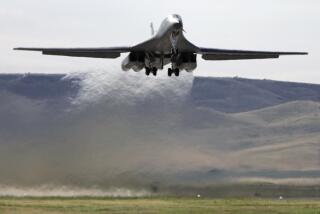Air Controller Was Hurt by Bomb
- Share via
WASHINGTON — The air controller involved in an accidental bombing in Kuwait this week was a U.S. Air Force enlisted man on temporary assignment who himself was injured in the deadly incident, Pentagon officials said Wednesday.
Air Force Staff Sgt. Timothy Crusing, a tactical air controller posted at Fort Campbell, Ky., was one of seven people injured when the Navy F/A-18 he was directing released three bombs near an observation post at the Udairi training range Monday evening. Crusing, a member of the 19th Air Support Operations Squadron, was hospitalized in stable condition after the accident, officials said.
It remains unclear whether the mistake that led to the accident was made by Crusing, by the F/A-18 pilot, Navy Cmdr. David O. Zimmerman, or by both. Defense Department officials said earlier this week that Crusing cleared Zimmerman to drop three unguided 500-pound bombs and then, a moment later, told Zimmerman to “abort, abort.”
The abort order came too late, and the bombs struck as close as 90 feet from an observation post where a group of 20 U.S., British, Kuwaiti and New Zealand military observers were standing. The post was about a mile from the warplane’s intended target.
A military investigative team scheduled to arrive in Kuwait today will try to determine the cause of the accident, which killed six people.
Although there was another controller on the scene at the time of the accident, Crusing was in sole control of the fighter’s strike, officials said. In “close air support” operations in wartime, the situation would be similar; forward air controllers are often well-conditioned enlisted troops who parachute into a battle zone to direct air attacks.
The other air controller present at the time, Air Force Staff Sgt. Jason M. Faley, was killed. Faley was also part of the Fort Campbell unit.
Since the incident, there has been speculation that laser designator equipment often employed in such situations to identify targets might have been misused. But officials said Wednesday that such gear apparently was not in use Monday.
The bombing exercises were conducted at the Udairi training range in northwestern Kuwait, about 30 miles from the Iraqi border. The exercises began at 1 p.m. and were to last until 9 p.m., according to officials at U.S. Central Command in Tampa, Fla., the military authority responsible for U.S. operations in the Mideast region.
The exercises were canceled after the bombs went astray about 7 p.m.
The father of an Army sergeant killed in the accident said Wednesday that he is not interested in placing blame but wants officials to concentrate on fixing problems that lead to training accidents.
“There’s a problem somewhere in our training, and I think we need to find out what the problem is and get it solved before we lose more people,” Mike Freligh of Gosnell, Ark., said on CBS’ “The Early Show.”
Freligh, father of Army Sgt. Phillip M. Freligh, said he does not think the pilot of the plane that dropped the bombs should be held accountable.
“I feel very, very much grief for the pilot of this plane, and I’m not looking for blame,” he said. “What I’m looking for is a solution to the problem.”
The U.S. Central Command said that the military investigation team is being headed by a three-star general and has 18 members, including pilots, investigators and lawyers. It has been instructed to complete its investigation by April 16.
The government of New Zealand, which lost a military observer in the accident, is sending a representative to take part in the probe.
The Kuwaiti government has begun a separate investigation.
The remains of the five U.S. servicemen and the New Zealand officer killed in the accident will arrive at Ramstein Air Base in Germany today, Central Command said.
More to Read
Sign up for Essential California
The most important California stories and recommendations in your inbox every morning.
You may occasionally receive promotional content from the Los Angeles Times.














